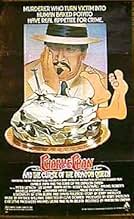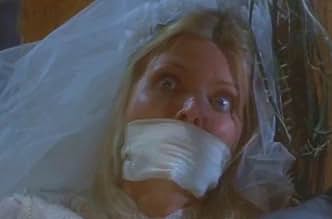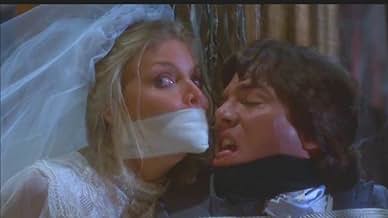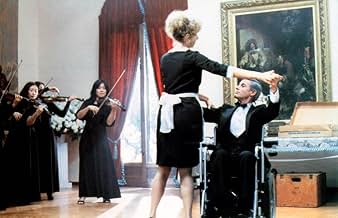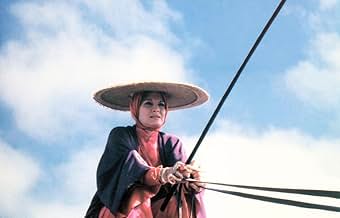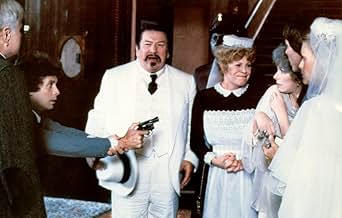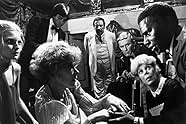CALIFICACIÓN DE IMDb
4.1/10
1.6 k
TU CALIFICACIÓN
El detective Charlie Chan ayuda a la policía de San Francisco a resolver los numerosos y extraños asesinatos. Su torpe nieto Lee, que se va a casar, le "ayuda". ¿Está la Reina Dragón detrás ... Leer todoEl detective Charlie Chan ayuda a la policía de San Francisco a resolver los numerosos y extraños asesinatos. Su torpe nieto Lee, que se va a casar, le "ayuda". ¿Está la Reina Dragón detrás de esto?El detective Charlie Chan ayuda a la policía de San Francisco a resolver los numerosos y extraños asesinatos. Su torpe nieto Lee, que se va a casar, le "ayuda". ¿Está la Reina Dragón detrás de esto?
- Dirección
- Guionistas
- Elenco
- Premios
- 1 nominación en total
Opiniones destacadas
This thing is no fun whatever.
Too bad, because it had a lot going for it.
First, there is the Charlie Chan legacy. It was something that walked with the movie-going public during that decade when our current notions of visual narrative evolved. It wasn't particularly influential except for the early notion that our on-screen eye differed from those around him in matters of cognition encoded visually by race. The explicit irony was the Chineseness of the man was deliberately bogus.
Second there's the appearance of Peter Ustinov. For this bit, you have to know the absolute importance of the fictional Hercule Poirot in how film discovery evolved. Ustinov had just played Poirot in the to-then most high budget detective story filmed. So when we see him (or did when this was new) as a similarly portly, pretentious, internally cogitating detective, it matters.
Third, someone involved was intelligent enough to set the thing properly. It begins with a faded black and white "old-style" Chan movie with our modern characters but a couple decades previously. The mystery shown bears on the one in our movie. Later, at the end of our movie, the action takes us to an old moviehouse in Chinatown where a Charlie Chan movie festival is being held. (No mention in our film that Chan has a film persona.) The trademarked end (copied from Poirot) where Chan gathers all the suspects and tells each one why they are the murderer, until revealing the real murderer (after a separately scripted false alarm) this happens in the scenery loft of the theater where a Chan film is playing below.
Naturally the chase to catch the murderer takes each character in front of the giant screen where the audience applauds them.
But its the truest of parodies. Usually parodies put new life into old form by adding a new layer of reference. Its a mistake to think that the "new life" would be funny, or more entertaining in any way. This is true parody: it took something that was dead and added enzymes to the decomposition.
There's one joke I appreciated. The Chan films are generally pretty vile in how they handle race. One trick is to set the bottom racially so that Chan can drift at the top in some cerebral racial advantage. That meant that the black driver was nearly subhuman. Stupid, ignoble.
The driver here is a black man also. Poised, attractive, articulate. We learn some noble things about him at the end.
Oh, another small matter of interest. It has a very young Michelle Pfeiffer, very pretty before she had all that work done on her face.
Ted's Evaluation -- 1 of 3: You can find something better to do with this part of your life.
Too bad, because it had a lot going for it.
First, there is the Charlie Chan legacy. It was something that walked with the movie-going public during that decade when our current notions of visual narrative evolved. It wasn't particularly influential except for the early notion that our on-screen eye differed from those around him in matters of cognition encoded visually by race. The explicit irony was the Chineseness of the man was deliberately bogus.
Second there's the appearance of Peter Ustinov. For this bit, you have to know the absolute importance of the fictional Hercule Poirot in how film discovery evolved. Ustinov had just played Poirot in the to-then most high budget detective story filmed. So when we see him (or did when this was new) as a similarly portly, pretentious, internally cogitating detective, it matters.
Third, someone involved was intelligent enough to set the thing properly. It begins with a faded black and white "old-style" Chan movie with our modern characters but a couple decades previously. The mystery shown bears on the one in our movie. Later, at the end of our movie, the action takes us to an old moviehouse in Chinatown where a Charlie Chan movie festival is being held. (No mention in our film that Chan has a film persona.) The trademarked end (copied from Poirot) where Chan gathers all the suspects and tells each one why they are the murderer, until revealing the real murderer (after a separately scripted false alarm) this happens in the scenery loft of the theater where a Chan film is playing below.
Naturally the chase to catch the murderer takes each character in front of the giant screen where the audience applauds them.
But its the truest of parodies. Usually parodies put new life into old form by adding a new layer of reference. Its a mistake to think that the "new life" would be funny, or more entertaining in any way. This is true parody: it took something that was dead and added enzymes to the decomposition.
There's one joke I appreciated. The Chan films are generally pretty vile in how they handle race. One trick is to set the bottom racially so that Chan can drift at the top in some cerebral racial advantage. That meant that the black driver was nearly subhuman. Stupid, ignoble.
The driver here is a black man also. Poised, attractive, articulate. We learn some noble things about him at the end.
Oh, another small matter of interest. It has a very young Michelle Pfeiffer, very pretty before she had all that work done on her face.
Ted's Evaluation -- 1 of 3: You can find something better to do with this part of your life.
During the 1930s Charlie Chan films were extremely popular with Asian American audiences; by the 1980s a later generation derided them for their use of Caucasian actors Warner Oland and Sidney Tolar in the title role. CHARLIE CHAN AND THE CURSE OF THE DRAGON QUEEN attempts to play to both sides of the coin, acting as both homage and parody of the original films. Not surprisingly, when released in 1981 it pleased neither.
Set in San Francisco, DRAGON QUEEN finds Chan called out of retirement in Hawaii to uncover a serial killer whose trademark is "bizarre deaths;" he is assisted by his grandson, a bumbling Lee Chan Jr. who proves as much hindrance as help. Like most films that do not fulfill their promise, the problem begins with the script: it never really references the Chan films in any significant way, nor does it ever develop the fangs required of an effective parody. Nor are the two leads well suited to their roles: both Peter Ustinov and Angie Dickinson are wildly out of place as Chan and the Dragon Queen, utterly unfunny in every imaginable way.
The saving grace of the film is in the supporting players. Perhaps the single most successful performer is Lee Grant in the role of Jimmy Jr.'s maternal and very Jewish grandmother. Grant aside, the always memorable Roddy McDowell and the brilliant Rachel Roberts jolt their every scene to life; Brian Keith plays against type as a hysterical and wildly profane police officer; and Richard Hatch is surprisingly good as Chan's bumbling grandson. Michelle Pfeiffer, in one of her earliest roles, is thrown in for good measure--and while the script gives her little to do beyond look pretty and giggle she does both extremely well.
Even so, this is not enough to save the film, which slowly but surely dissolves into a morass of very obvious slapstick humor; when all is said and done, the end result is rather like THE GOOD EARTH MEETS THE PINK PANTHER. It has moments, but it is more awkward than amusing. Four stars for the efforts of Lee Grant, Roddy McDowell, Rachel Roberts and company, but--and in the words of the original screen Chan--most viewers should say "Thank you so much!" and pass along another way.
GFT, Amazon Reviewer
Set in San Francisco, DRAGON QUEEN finds Chan called out of retirement in Hawaii to uncover a serial killer whose trademark is "bizarre deaths;" he is assisted by his grandson, a bumbling Lee Chan Jr. who proves as much hindrance as help. Like most films that do not fulfill their promise, the problem begins with the script: it never really references the Chan films in any significant way, nor does it ever develop the fangs required of an effective parody. Nor are the two leads well suited to their roles: both Peter Ustinov and Angie Dickinson are wildly out of place as Chan and the Dragon Queen, utterly unfunny in every imaginable way.
The saving grace of the film is in the supporting players. Perhaps the single most successful performer is Lee Grant in the role of Jimmy Jr.'s maternal and very Jewish grandmother. Grant aside, the always memorable Roddy McDowell and the brilliant Rachel Roberts jolt their every scene to life; Brian Keith plays against type as a hysterical and wildly profane police officer; and Richard Hatch is surprisingly good as Chan's bumbling grandson. Michelle Pfeiffer, in one of her earliest roles, is thrown in for good measure--and while the script gives her little to do beyond look pretty and giggle she does both extremely well.
Even so, this is not enough to save the film, which slowly but surely dissolves into a morass of very obvious slapstick humor; when all is said and done, the end result is rather like THE GOOD EARTH MEETS THE PINK PANTHER. It has moments, but it is more awkward than amusing. Four stars for the efforts of Lee Grant, Roddy McDowell, Rachel Roberts and company, but--and in the words of the original screen Chan--most viewers should say "Thank you so much!" and pass along another way.
GFT, Amazon Reviewer
If the A.F.I. decides to vote on the 100 best kisses in American Film, they have to put Richard Hatch's and Michelle Pfeiffer's kiss in the top ten. Not only are we talking tung, but a 45 second smooch that makes the viewers laugh as well as cry. Fast forward to this scene first, the rest of the film can wait.
2tavm
Having just spent the last several days reviewing past Charlie Chan movies in series chronological order, not to mention previously reviewing Charlie Chan in Paris back in 2006, I decided to finally watch this spoof of the great Honolulu detective that I just bought on VHS from a used video store. In summary, this was a clumsy, jumbled slapstick mess that only rated a few chuckles from me due to some witty lines near the end. And Peter Ustinov is wasted as Chan as he sounds more like an Englishman impersonating a Chinese man than more convincing portrayals from the likes of Warner Oland and Sidney Toler (I have yet to rewatch a Roland Winters one that I haven't seen in 30 years). And how convenient to have his grandson Lee, Jr.'s (Richard Hatch) parents (one of whom is Jewish) be killed in a car crash so as not to have Keye Luke make an appearance. ("No. 1 Son" as a young man here is played by David Hirokane) The fact that he's not there nor is Earl Derr Biggers credited as creator here is just as well since this movie does nothing to honor their contributions. And the supporting cast of Hatch, Lee Grant, Rachel Roberts, Roddy McDowall, Brian Keith, and, in one of her earliest roles, Michelle Pfeiffer are just wasted as well, never mind Angie Dickinson as the Dragon Queen. Director Clive Donner seems to want to do a Mel Brooks-like parody down to the Blazing Saddles-like climax but there's nothing the least bit creatively funny here. So on that note, I'd only recommend Charlie Chan and the Curse of the Dragon Queen for anyone curious about the treatment of this once-iconic hero. P.S. Screenwriter David Axelrod is another of these film and TV members I'm citing as born in my birthtown of Chicago, Ill.
I liked the Charlie Chan movies I remember watching on television when I was growing up, I like Peter Ustinov very much and I thought it a very bold stroke to have Angie Dickinson play the "Dragon Queen" (a role made for the likes of a Lucy Liu).
That's why I'm irritated by having rented this movie. It's just awful - truly truly awful. You'll sigh, you'll look at your watch, you'll feel as if you're stuck with some adolescent in an elevator trying out his impressions for 17 hours until they free you.
Don't rent it - it's just TERRIBLE - and with this cast, that's such a shame.
That's why I'm irritated by having rented this movie. It's just awful - truly truly awful. You'll sigh, you'll look at your watch, you'll feel as if you're stuck with some adolescent in an elevator trying out his impressions for 17 hours until they free you.
Don't rent it - it's just TERRIBLE - and with this cast, that's such a shame.
¿Sabías que…?
- TriviaIn the Shanghai bar scene, Lee Chan, Jr. (Richard Hatch) orders a "Captain Apollo on the rocks." Captain Apollo was Hatch's character on Battlestar Galactica (1978).
- Errores(1:23:58) The text of the newspaper clipping ("Pineapple King In Love Tryst") doesn't reference the case in the slightest.
- Citas
Charlie Chan: Process of aging never agreeable, but better than alternative.
- ConexionesEdited into How American Cinema Changed Hollywood Forever (2003)
- Bandas sonorasHappy Birthday to You
Written by Patty S. Hill and Mildred J. Hill
Performed by Michelle Pfeiffer and Richard Hatch
Selecciones populares
Inicia sesión para calificar y agrega a la lista de videos para obtener recomendaciones personalizadas
- How long is Charlie Chan and the Curse of the Dragon Queen?Con tecnología de Alexa
Detalles
- Fecha de lanzamiento
- País de origen
- Idioma
- También se conoce como
- Charlie Chan i kletva zmajske kraljice
- Locaciones de filmación
- Productoras
- Ver más créditos de la compañía en IMDbPro
Contribuir a esta página
Sugiere una edición o agrega el contenido que falta

Principales brechas de datos
By what name was Charlie Chan and the Curse of the Dragon Queen (1981) officially released in India in English?
Responda
